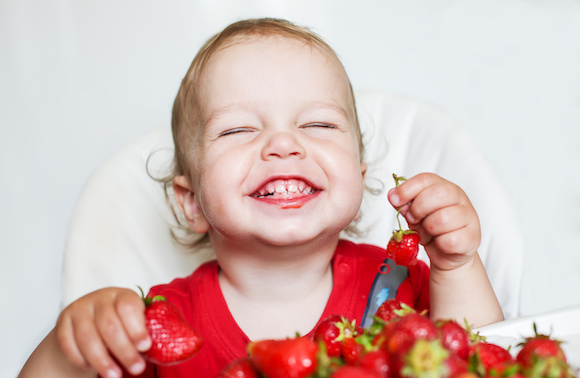
The basic rule of thumb on feeding your toddler:
You choose what foods she eats.
She chooses how much she eats, and how.
Why?
Because each of us is born with inner signals that tell us how much we need to eat. When we override our children's innate body cues by pressuring them to eat, we erode their natural self-regulation and cause later food issues, from pickiness to weight-management.
We all want our children to eat so they grow strong and healthy. But we have to trust that they know their bodies better than we do, as long as we don't confuse them.
Toddlers don't need much. Many of them eat a lot one day and very little the next, but children don't starve themselves. If you obsess about how much she eats, or get into fights with her about food, you're setting up power struggles. You can't win a fight with someone about their own body. And you wouldn't want to.
If you want your child to be able to regulate their own eating for the rest of their life, it's good to get clear right from the start that your child is in charge of how much food she takes into her body. Your job is just to make sure that what she's offered is healthy.
Your goals?
- Give your child the opportunity to taste a wide range of foods, which develops the taste buds.
- Keep the foods your child is exposed to healthy, to delay the development of sugar and salt cravings.
- Give your child control over what she chooses to put in her mouth, which diminishes power struggles and the risk of later eating disorders.
What about having a lovely family dinner with conversation and connection? That's a wonderful goal, but your toddler is not yet developmentally ready for that. Don't expect a toddler to sit and eat for the time it takes an adult to consume a meal. For now, lay the foundation by keeping meals stress-free and enjoyable. (See Getting Toddlers to Sit at the Table for Dinner.)
Your strategy?
- Wait as long as possible before introducing sweets and don't keep sweets in the house.
- Offer a variety of healthy foods at each meal.
- Keep meal and snack times regular.
- Don't push your toddler to eat more than she wants, or reward her for eating a lot.
- Don't follow your toddler around shoveling food into her mouth.
- Let your toddler feed himself. Sure it's messy, but it's worth it. Use a splat mat.
What about snacks?
Toddlers' little stomachs need numerous smallish meals throughout the day. That means snacks, but it doesn't ever mean unhealthy food. The best toddler snacks are simply smaller portions of food you would be happy to see them eat at a meal: healthy crackers with cheese or peanut butter, cut up fruit, soup, hard boiled eggs, yogurt, steamed broccoli.
Many toddlers are too busy during the day to eat enough and ask for food at bedtime. This can drive a parent around the bend, unless you build a bedtime snack into the schedule – which also often helps kids settle down and sleep better. You can combine it with the bedtime story if you’re short on time, but bedtime snacks for toddlers are always a good idea.
Worried about a picky eater?
Most toddlers go through a picky stage. There's an evolutionary reason -- toddlers are "programmed" genetically to only eat familiar foods because unfamiliar foods could be poisonous. Those toddlers who were adventurous eaters probably didn't live long enough to pass their genes on to us, so we most likely come from a long line of picky toddler eaters!
Don't make special food for your toddler at dinner because you're bound to resent it and it sends her the wrong message. Just serve a variety of healthy foods and let them decide what to try. If your dinner isn't toddler-friendly -- if, heaven forbid, all the food is touching in a casserole, for instance -- then put some simple extras on the table, such as cheese slices, hard-boiled egg, or veggies with hummus for dipping.
Don't worry that your child will always be a picky eater. That's rare, as long as they have an array of healthy foods from which to choose, and don't get addicted to junk food.
Talk about healthy food choices, but above all, talk about taste. When you say "Delicious!" and clearly mean it as you take a taste of a food, your child is much more likely to want to try it than when you say "This is so good for you!"
Taste buds change to enjoy a variety of tastes, including bitter tastes, as kids get older. Eventually virtually ALL kids come to enjoy the foods they've seen their parents enjoy.
Photo Credit: Thank you to AutumnFawn Photography
Some letters and advice with lots more information on toddlers and healthy eating:
Healthy Eating for 2 year old? »
Getting Toddlers to Sit at the Table for Dinner »
Getting Toddlers to Eat Veggies »
Toddler has Become Picky Eater »





